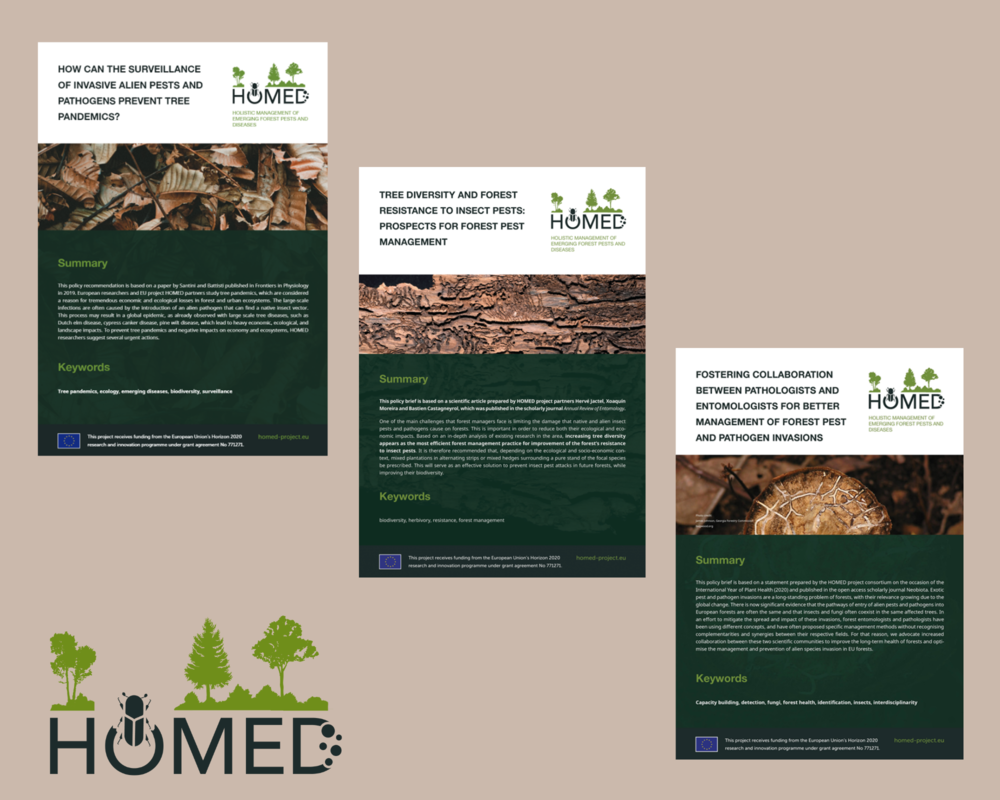holistic management of emerging forest pests and diseases
Science towards policy: New approaches towards improving forest resistance to invasive alien species
A collection of policy briefs calls to action for combating forest pests and pathogens through adopting new surveillance techniques, increasing tree diversity in forests, and fostering collaboration between pathologists and entomologists

HOMED's collection of policy briefs
Invasive alien pests and pathogens are a challenge posed in front of forest managers in Europe and around the world. Invasions have a profound impact on forest ecosystems and nature’s contributions to people. The development of innovative efficient practices for management of alien pest and pathogen invasions is therefore of essential importance for forest managers and policy makers.
The EU-funded research project HOMED (HOlistic Management of Emerging forest pests and Diseases, grant agreement No. 771271) is dedicated to the mitigation of the negative effects on European forests caused by invasive alien pests and pathogens. As such, the project provides advice to policy makers for the adoption of new methods of prevention, detection, identification, eradication, containment or control of these invasive species. The project’s collection of policy briefs consists of separate concise outputs that provide short and informative research-based analysis that outline the rationale for choosing a particular policy alternative for resolving a policy issue, or introduce a new science-based solution for improvement of existing matters.
The first HOMED policy brief called "How can the surveillance of invasive alien pests and pathogens prevent tree pandemics?" is based on the article by HOMED researchers Alberto Santini and Andrea Battisti "Complex Insect-Pathogen Interactions in Tree Pandemics", which was published in the Frontiers in Physiology journal. The policy brief provides recommendations to policy makers for better prediction and prevention of pandemics caused by invasive alien pests and diseases in European forests through improving surveillance of Invasive Alien Species.
The second HOMED policy brief called "Fostering collaboration between pathologists and entomologists for better management of forest pest and pathogen invasion" advises on the development of science-based guidelines for the closer collaboration between pathologists and entomologists in the sphere of forest management of Invasive Alien Species. It is based on a statement prepared by the HOMED project consortium on the occasion of the International Year of Plant Health (2020) and published in the open access scholarly journal Neobiota.
The third HOMED policy brief called "Tree diversity and forest resistance to insect pests: prospects for forest pest management" is based on the article by HOMED researchers Hervé Jactel, Xoaquín Moreira and Bastien Castagneyrol "Tree Diversity and Forest Resistance to Insect Pests: Patterns, Mechanisms and Prospects" which was published in the Annual Review of Entomology journal. The document provides recommendations to policy makers for better biological control of invasive alien pests and diseases in European forests through the increasing of tree diversity at the stand level to improve forests’ natural resistance to insect pests.
The HOMED collection of policy briefs keeps growing, with more policy briefs on the way before the end of the project’s lifetime. The policy-oriented documents and materials are presented to relevant stakeholders in an effort to promote and support the development of the EU policy framework focused on forest protection from invasive alien species.
Read more and access the HOMED collection of policy briefs here.